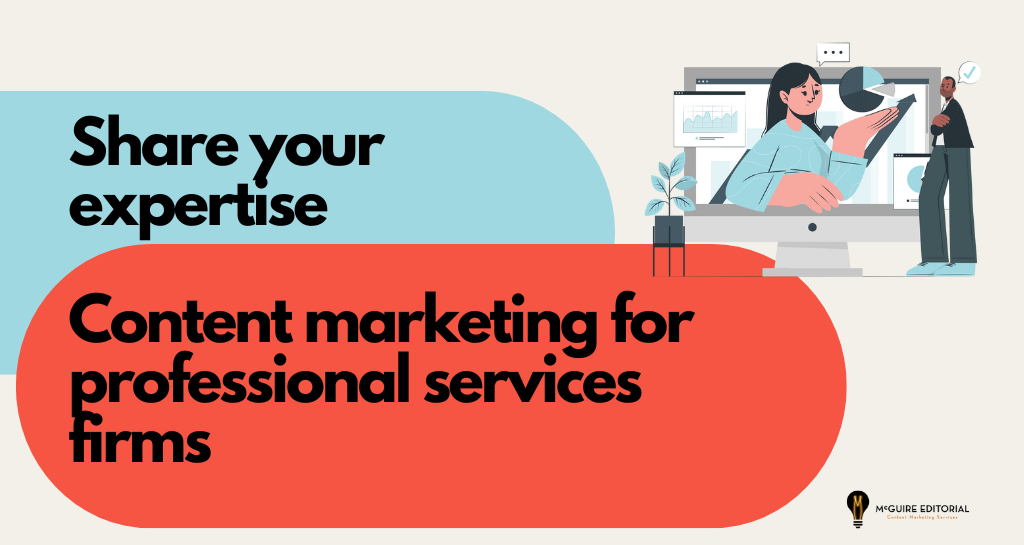The professional services industry is clearly thriving, and investment in its own training and development is at a ten-year high. Now is the time for your business to expand. But how? How do you reach new audiences and solidify your firm’s message, without simply throwing more money at stale advertisements and networking lunches?
The answer is content marketing.
Content marketing is, as Robert McGuire explains, “a plan to grow and engage your customer base that is built around discovering what you can do for someone else, developing and delivering related content, and then measuring the results.” This can come in the form of articles, listicles, podcasts, e-books and whitepapers — all aiming to provide valuable, informative content rather than plugging the service itself.
If you build your online presence, they will come
At the beginning of 2015, Business2Community.com reported that half of all professional service firms were planning to undertake content marketing initiatives. The article called content marketing “tailor-made for professional services,” because it “empowers you to demonstrate your firm’s expertise. When you publish content on the web, it enables prospects to find you and sample a slice of your knowledge.”
Indeed, the legal sector is already embracing this strategy. International law firms Baker & McKenzie and Goodwin Procter are, as the article Why Legal Firms Are Racing to Adopt Content Marketing points out, “blogging about intellectual property right concerns, data privacy, new SEC regulations and other trending legal topics.”
Another firm, Covington & Burling, is said to have more than ten different blogs. In the same article, California criminal defense attorney Grant Bettencourt calls content marketing a “must” for reaching new clients.
“When people have a legal question or are worried about [an] immigration case, or felony conviction, they turn to Google,” Bettencourt is quoted saying. “[This] is where content marketing can really prove invaluable. When legal practices publish engaging content that answers these questions, practices can raise their own profile and further establish themselves as a local leader on these hot issues.”
Traditional ads are no longer enough
Historically, professional service firms have grown their client base through personal referrals, networking and traditional advertising. Now, in an increasingly digitized world, reaching new audiences requires creativity with a widespread, multi-channeled message.
According to AdWeek, “Eighty-one percent of shoppers conduct online research before they make a purchase. Sixty percent begin by using a search engine to find the products they want, and [sixty-one] percent will read product reviews before making any purchase.”
Similarly, McGuire describes today’s consumers as “more empowered in general, more discriminating, more resistant to advertising, less loyal and quicker to change brands.”
This is why the banners on a city bus and newspapers ads of the past are no longer enough. Not utilizing content marketing can prove to be a notable disadvantage. A Business2Community.com (B2C) study of B2B sales tactics conducted with RAIN Group found, “the top reason folks fail to win a new client is that they do not educate the prospect or provide new insights on how to solve their problem.”
When those eighty-one percent go online to research professional services, valuable content from your firm should be waiting for them: an accountant’s white paper about how CPAs increase tax returns, a doctor’s health advice column, an engineer’s article about cutting-edge techniques.
B2C’s article, 5 Professional Services Marketing Trends to Watch in 2016, notes that publishing educational content makes expertise more visible, and professionals become “known for their proficiency in a market or discipline, [broadening] their reach and accelerating their ascent.”
Yes, an online human connection is possible (and necessary)
Content marketing for professional services firms can also reach consumers in a more visceral way. A recent Content Marketing Institution article about creating persuasive content posits that half of all consumer purchases are driven by emotion.
The Vishno Law Firm, for example, asserts bold personality with its statistic-driven educational pieces about hot-button topics. They reassure potential clients by publicizing recent victories, and they establish trust with their website’s “Live Chat” option.
Putting out well-written, engaging and informative content marketing that is specifically created for your target audience builds relationships and establishes that trust. The human connection is vital.
Believe in your business and invest in its success. Content marketing will help transition your company into the digital age, while expanding and solidifying your audience and clientele. Your potential customers are part of a diverse, wide-ranging client base who make choices based on meticulous research, educational resources and careful deliberation. If consumers are comparing your firm with others at the click of a mouse, then educational, useable information — the product of great content marketing — will be the reason they choose (and stay with) you.

Dan Hajducky
Guest author

